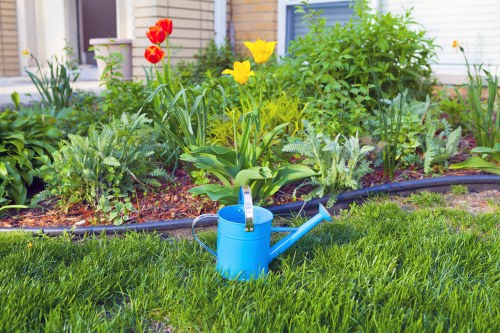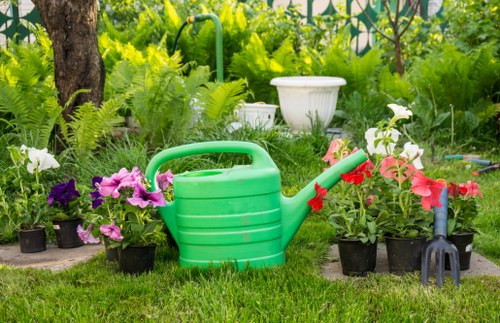Comprehensive Guide to Hedge Trimming in Finchley

Maintaining a beautiful garden starts with well-trimmed hedges. In Finchley, homeowners take pride in their green spaces, and proper hedge trimming plays a crucial role in achieving that. Whether you’re looking to enhance your property’s curb appeal or ensure the health of your plants, understanding the essentials of hedge trimming in Finchley is vital.
Hedge trimming is not just about aesthetics; it also promotes the health and growth of your hedges. Regular trimming helps prevent diseases, encourages dense growth, and keeps your hedges in shape. In Finchley, where gardens range from small urban spaces to expansive suburban yards, the approach to hedge trimming can vary, but the principles remain the same.
Before starting any trimming project, it’s important to assess the type of hedge you have. Different plants require different trimming techniques and schedules. Whether you have a traditional box hedge, a flowering hedge, or a native variety, understanding its specific needs will ensure you achieve the best results.

Essential Tools for Hedge Trimming
Having the right tools is essential for effective hedge trimming. Investing in quality equipment can make the process easier and result in a more polished appearance for your hedges.
Basic Tools You’ll Need
- Hedge Trimmers: Electric or gas-powered trimmers are suitable for most hedging tasks.
- Pruning Shears: Ideal for precision cuts and shaping smaller areas.
- Loppers: Useful for thicker branches that regular shears can’t handle.
- Protective Gear: Gloves, safety glasses, and appropriate footwear are essential for safety.
Maintaining your tools is equally important. Regularly cleaning and sharpening your trimmers and shears will ensure they perform efficiently and last longer.

When to Trim Your Hedges in Finchley
Timing is key when it comes to hedge trimming. Trimming at the right time promotes healthy growth and prevents damage to your plants.
Best Seasons for Trimming
- Spring: Early spring is ideal for shaping hedges before the new growth begins.
- Late Summer: A light trim in late summer can help maintain shape and encourage dense growth.
- Avoiding Winter: Trimming during winter can harm the hedges as plants are dormant and more susceptible to damage.
In Finchley’s climate, it’s important to avoid trimming during extreme weather conditions. Mild days provide the best environment for your hedges to recover post-trimming.

Step-by-Step Hedge Trimming Guide
Trimming hedges might seem daunting, but following a structured approach can simplify the process and yield great results.
Preparation
- Assess the Hedge: Determine the current shape and health of your hedge.
- Gather Tools: Ensure all your trimming tools are ready and in good condition.
- Safety First: Wear protective gear to prevent injuries.
Trimming Process
Start by removing any dead or diseased branches. Then, begin shaping the hedge by cutting evenly along the sides and top. For a uniform look, use stakes or a guide to maintain straight lines.

Maintaining Healthy Hedges
Proper maintenance extends beyond trimming. Regular care ensures your hedges remain vibrant and resilient.
Watering and Feeding
- Consistent Watering: Keep the soil moist, especially during dry spells.
- Fertilizing: Use a balanced fertilizer to provide essential nutrients.
- Mulching: Mulch helps retain moisture and suppress weeds.
Monitor your hedges for signs of pests or diseases and address any issues promptly to prevent them from spreading.
Local Experts in Finchley
When in doubt, seeking professional help can make a significant difference. Finchley boasts a range of skilled hedge trimming services that cater to different needs and budgets.
Choosing the Right Service
Look for companies with good reviews, experienced staff, and a portfolio of completed projects. A local expert understands the specific climate and conditions of Finchley, ensuring your hedges receive the best care possible.
Cost of Hedge Trimming in Finchley
The cost of hedge trimming can vary based on the size of your garden, the type of hedges, and the complexity of the job. On average, homeowners in Finchley can expect to pay between £50 to £200 for professional hedge trimming services.
Factors Influencing Cost
- Size of the Hedge: Larger hedges require more time and effort.
- Accessibility: Easier-to-reach hedges may cost less than those in hard-to-access areas.
- Season: Prices can fluctuate based on demand during peak gardening seasons.
Environmental Benefits of Hedge Trimming
Regular hedge trimming not only enhances your garden’s appearance but also contributes to the local environment.
Promoting Biodiversity
Healthy hedges provide habitats for various insects, birds, and other wildlife. By maintaining your hedges, you support Finchley’s natural ecosystem.
Improving Air Quality
Hedgerows act as natural air filters, absorbing pollutants and releasing oxygen. Well-maintained hedges are more effective in this role.
10-15 Nearby Areas to Finchley for Hedge Trimming Services
Finchley is surrounded by numerous neighborhoods and towns that also benefit from expert hedge trimming services. Here are some nearby areas to consider:
- Mill Hill Just north of Finchley, Mill Hill offers a mix of urban and suburban gardens perfect for hedge maintenance.
- West Finchley: A vibrant community with diverse green spaces requiring regular trimming and care.
- East Finchley: Known for its family-friendly atmosphere and well-kept hedges in residential areas.
- West Hendon Close to Finchley, West Hendon features larger properties with extensive hedging needs.
- East Barnet Offers a blend of parks and private gardens that benefit from professional trimming services.
- Colindale A rapidly growing area where new developments often require landscaping and hedge maintenance.
- Golders Green An upscale neighborhood with meticulously maintained gardens and hedges.
- High Barnet: Features expansive gardens and green belts ideal for regular hedge trimming.
- Whetstone Balances residential gardens with public parks, both needing hedge care.
- Tottenham Park: A mix of urban and green spaces that benefit from ongoing maintenance.
- Burnt Oak Known for its large gardens and hedges that require periodic trimming.
- East Finchley With a variety of plant species, tailored trimming services are essential.
- West Hendon Offers a range of services for both small and large hedges in the area.
- Cockfosters Surrounding areas benefit from expert hedge trimming to maintain their natural beauty.
- Brent Cross A commercial hub with landscaped areas that require regular upkeep.

Maintaining hedges in these areas ensures that Finchley and its surroundings remain green and attractive, contributing to the overall charm of the community.
Whether you reside in Finchley proper or in one of the nearby areas, taking care of your hedges can significantly enhance your outdoor space. Proper trimming not only improves the look of your garden but also supports the health of your plants and the local environment.
In conclusion, hedge trimming in Finchley is an essential aspect of garden maintenance that offers both aesthetic and environmental benefits. By understanding the best practices, investing in the right tools, and knowing when and how to trim, you can ensure your hedges remain a beautiful and healthy part of your home.
Frequently Asked Questions
1. How often should I trim my hedges in Finchley?
Generally, hedges should be trimmed at least twice a year—once in late spring and once in late summer. However, the frequency can vary based on the type of hedge and its growth rate.
2. What are the best tools for hedge trimming?
The essential tools include hedge trimmers (electric or gas-powered), pruning shears, loppers, and protective gear such as gloves and safety glasses.
3. Can I trim my hedges myself, or should I hire a professional?
While small hedges can be trimmed by homeowners with the right tools and knowledge, larger or more complex hedges may benefit from professional services to ensure they are maintained properly.
4. What time of year is best for hedge trimming?
Late spring and late summer are ideal times for hedge trimming. Avoid trimming during winter when plants are dormant and more susceptible to damage.
5. How does hedge trimming benefit the environment?
Healthy hedges support biodiversity by providing habitats for insects and birds, and they improve air quality by absorbing pollutants and releasing oxygen.